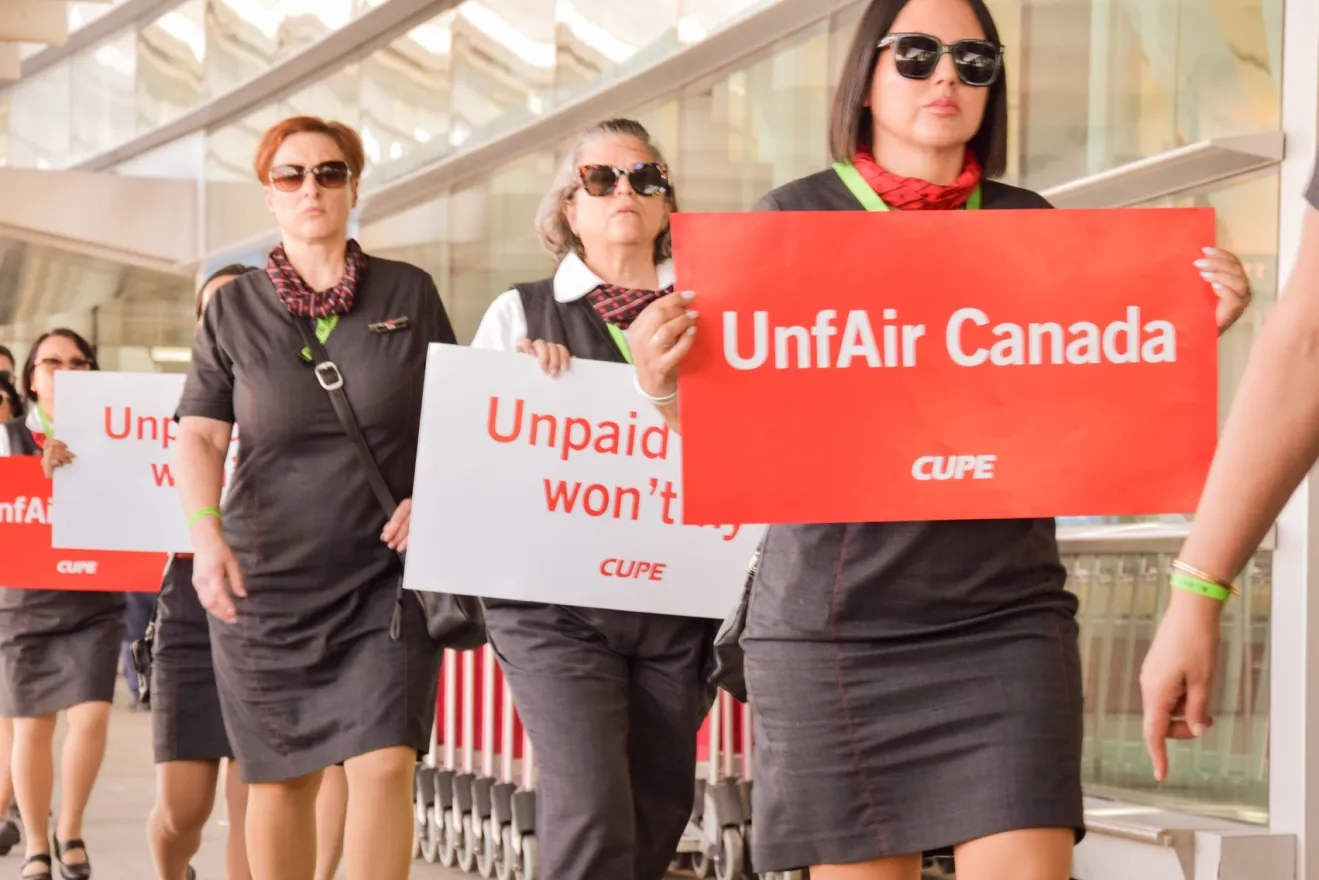
As of Saturday, 10,000 flight attendants could walk off the job at Air Canada. Already, Air Canada is threatening to lock out the workers and has appealed to the government to take away the right to strike. Only a determined struggle can beat back these egregious attacks, defend the right to strike and win decent wages and conditions for the workers.
Low wages, unpaid work
Air Canada flight attendants are some of the worst paid, hyper-exploited workers in Canada. The wage of a full-time junior flight attendant is just $1,952 per month—almost $900 less than minimum wage. It is therefore not surprising that they voted 99.7 per cent in favour of strike action. Flight attendants are pissed off—and rightly so.
One of the reasons for this is that they were locked into an unusually long 10-year contract which kept wages low while inflation was rampant. According to the union, in the past 25 years inflation has increased by 69 per cent while wages have only risen by 10 per cent. The result has been massive wage erosion.
In addition to the question of wages, flight attendants perform hundreds of hours of unpaid work. Despite being required to be at the airport at least an hour before their flight, Air Canada flight attendants only get paid for the time they are in the air. This means an average of 35 unpaid hours of work per month.
Recently, Air Canada claimed it would make their flight attendants the best paid in the country. But this ridiculous claim was just a marketing ploy to make the company look good. Air Canada’s offer of a 17.2 per cent wage increase over four years would mean that wages for entry level flight attendants would remain far below the minimum wage and much less than what flight attendants at other airlines earn.
When it comes to unpaid work, Air Canada is offering to pay flight attendants for 50 per cent of the time they work! How generous!
While Air Canada rakes in billions, the workers responsible for their customers’ comfort and safety are forced to wait in line at food banks.
All out for the strike!
This conflict is a microcosm of the class struggle in Canada. Over the past couple of decades, living conditions have been eroded. Bad union contracts signed by leaders who tried to conciliate with employers have contributed to the problem. But the workers can only take so much. There is an immense anger brewing among workers in all sectors.
And, things are only going to get worse.
Not just Air Canada, but Canadian capitalists in general, have a lot at stake in this strike. Amid the trade war, Air Canada’s profit margins have fallen by 50 per cent—their continued profitability depends on their ability to squeeze workers. A strike will cause countless losses in refunded flights and new flights for customers abroad during one of the busiest travel seasons, also affecting Canadian tourism. The strike will also impact businesses that use Air Canada for time-sensitive shipping. On the other hand, a win for the flight attendants would set a good example for the rest of the working class, which the bosses cannot tolerate.
It is clear that Air Canada has no intention of, or interest in, bargaining in good faith. Their declaration of a lockout and the fact that they have already started to cancel flights shows that they plan to stand their ground. They are asking the government to use section 107 of the Canada Labour Code to impose binding arbitration. This would take away the right to strike right and impose a new contract. The government has invoked section 107 six times in the past two years, each time ending in favor of the bosses.
But this is nothing new at Air Canada. In 2011, the federal government threatened back-to-work legislation and CUPE submitted to binding arbitration. But this wasn’t just used against flight attendants: that year alone, back-to-work legislation was used four times against Air Canada workers.
But that struggle proves an instructive example not just of the heavy hand of the government, but also of how the workers can fight back. The next year, Air Canada workers at Toronto-Pearson and Montreal-Trudeau Airports initiated a wildcat strike in response to the unfair suspension of three workers. Not only were the three workers reinstated, but so were the dozens of workers fired during the strike. This demonstrated the power of just a few hundred workers at two airports who took this action without support from their union.
To fight and win flight attendants can not rely on closed-door agreements, but only on their own strength, which could shut the tourism and air travel industry down. This is precisely what the bosses are worried about.
A decisive, all-out strike of 10,000 flight attendants, in defense of trade union rights and for better living conditions is the only way forward. Such a movement could easily galvanize popular support of millions of other workers who already sympathize with the fight attendants.
All out for the strike!
Defy section 107!
Fight to win!

